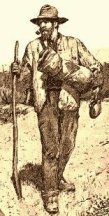
Mary Bryant
All the convicts would have had many unique stories to tell our ears today but alas their stories are buried with them. Mary Bryant was one of these stories and hers was recorded. Any search engine will bring up her story better still see if you can get one of the books about her life it's fascinating reading.
Mary was sentenced in 1786 at the age of 21 and like many others to 7 years hard labour in the Colony. March 28th 1791 saw Mary and several men steal a boat and tried to escape this colony life. Mary was the instigator in this daring adventure and she thought she could follow Captain Bligh's footsteps and reach English shores. Incredibly they made it to Coupang, (Timor) the journey in a small boat which included small children had covered 5,000 kilometres. They made a few stops along the way for hunting, eating and finding fresh water.
Alas they were captured as they let slip accidently who they really were to the Dutch. They had told the Dutch people they were survivors of a shipwreck. They were then taken into custody and sent to Batavia (Jakarta) all died here excepting Mary. Mary and her daughter were shipped back to England but sadly her daughter Charlotte died on the voyage. Back in England Mary's story spread like wildfire that eventually she was pardoned. Mary then returned to her family in Cornwall in May 1793 and disappeared into obscurity.
Gold in Australia was first discovered by Rev. W.B. Clark in 1841 but he was "gagged" from announcing this to the colony for reasons only known to the then Governor Sir George Gipps. Edward Hardgreaves, an Aussie veteran of the USA gold rush found gold at Macquarie River near Bathurst in 1851. The gold rush within time was on for young and old from all round the island, for at this time most of these "diggers" had had experience at the Californian gold mines.
One good outcome of these gold rush days was that some towns were born like Kalgoorlie, Coolardie and Ballarat but sadly others are still ghost towns today.
The gold also brought trouble especially for the locals surrounding these areas of the finds. Other trouble arose when there was no law and order, no roads, no water, no food, no houses it led to crime and disease. When local businessmen heard that in their neck of woods gold had been discovered they'd often abandon their business. The ones that remained behind would then raise their prices beyond belief, not very fair to the local people trying to make an honest living. In retaliation to all this crime and disrespect a new law was introduced no gold could be removed without having gained a license costing 30 shillings a month. Many could not afford this hence it slowly led to the Eureka Stockade.
If you are interested and want to read the story about the Eureka Stockade then this site is worth reading..........
Ned Kelly came into this world in the year 1854. He was the eldest of eight children. His life was already set in motion by his parents being convicts who were charged with petty crimes back in Ireland and transported to the penal colony. His mother was jailed for 3 years for shooting a policeman. His father died when he was twelve years old. Ned was convicted for three years for stealing a horse on being released he was 16 this being the year 1874, then his Mother went to gaol in 1878. The course Ned Kelly and his gang were on needs some understanding of the circumstances that led him onto this road of crime. Ned's family (being on the bottom of the rung in Australian Society of the time) faced poverty, a situation impossible to survive with, as these "selectors" were many a time handed plots by the Government that were either too small or the soil impossible to work with. Many of the Kelly family were forced off this land by "Squatters" which meant they either starved or turned to a life of crime to survive. Often these poor people turned to a life of crime in stock rustling, bush-rangers, often with sympathy and support of other local people, as these "criminals" often shared part of their haul with poor people. The reason a great many bush-rangers eluded capture was because of this local network of informers who let them know when the troopers were around.
One of his first offences was that of stealing a horse and soon after was arrested again for "possession of a stolen horse" which he said at the time he had no idea it was stolen but still did three years of hard labour.
He and his younger brother were wrongly accused of attacking a wounded policemen (1878). They fled to the bush and the Kelly Gang was created, they moulded together a suit of armour to protect them from the police bullets but at same time this made them awfully clumsy, the suit being made so heavy.
After his released Ned did try to stay on the right side of the law but that did not last for long. The day of repentance came when Constable Alexander Fitzpatrick visited the Kelly home and here I stop to say that there are many contradictory stories as to what really took place and why Fiztpatrick paid them a visit in the first place. What ever took place this day his mother ended up being sent to gaol and a hundred pound reward was offered for the capture of this outlaw.
Then Ned and friends accidently came across three policemen that Ned believed intended killing him. He called "surrender" but the three of course resisted and lost their lives. The reward for the capture of Ned kelly rose to two thousand pounds - a lot of money back in 'em days. Surprisingly the Kelly Gang had many supporters and these people helped the Kelly gang keep out of the authority's way. They robbed the rich so in keeping with the Robin Hood image were very popular with the common folk, in fact Ned would often hand a letter to one of these poor hostages explaining how he'd been persecuted by the police.
The persecution came to an abrupt end when the police caught up with Ned and the others that were in the Glenrowan hotel with hostages. At the end of the bloody battle Ned was still alive he had 28 bullet wounds which after he had recovered his destiny was set in motion. Depsite the petition of thousands that his life be spared, he was on the 11th November 1880 hanged till dead in Melbourne gaol, he was twenty five years old. The other bushrangers of this fate this day, were 2 (Dan Kelly and Steve Hart) burnt to death when the hotel was burnt to the ground and the other (Joe Byrne) had been shot earlier on in the day.
I have often wondered why the Australians hold Ned Kelly in such high esteem *giggles* but then remembers her own folklore's legend Robin Hood!



